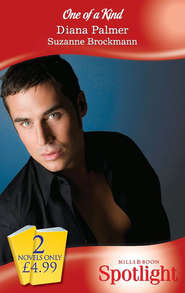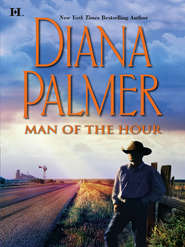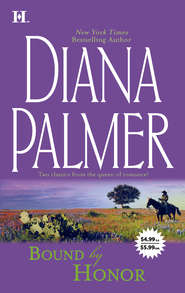По всем вопросам обращайтесь на: info@litportal.ru
(©) 2003-2024.
✖
Magnolia
Настройки чтения
Размер шрифта
Высота строк
Поля
She gave him a clear, uncomplicated look, something akin to worship in her soft eyes as she stared up at him, flushed with delight.
His lips parted to speak the words that would end the farce. But somehow, looking into those soft gray eyes through the thin white veil, he couldn’t find the words. He just stood there, speechless. She looked so pure, so untouched, so innocent. So much in love, he thought bitterly. And suddenly, the thought of hurting her was insupportable.
“Is…something wrong with my dress?” she asked worriedly.
“No,” he replied curtly. He glanced back at the full church and made a rough sound. “Wait for the music, Claire,” he said stiffly, and turned to go back down the aisle to the altar, where the minister waited to marry them. He was disgusted with himself. Pity was no excuse for marriage. His heart was forever Diane’s, now more than ever.
Good Lord, would he ever forget what Diane had just confessed to him? Would he ever forget the torment in those beautiful eyes? How could he have thought to marry Claire when a simple loan of money would have done equally well? But sanity had come far too late to save him. He could hardly walk out of the church now, with half of Atlanta’s most prominent citizens watching. The scandal would ruin him…and Claire. He had to go through with it.
Claire heard the music start and she walked down the aisle, all alone. There was no one to give her away; there were no bridesmaids, no attendants. It was a church wedding, but more funereal in tone than joyous. John had looked angry, unhappy. She glimpsed Diane through her veil and saw the woman looking straight at John with a curious, drawn expression. She still wanted him, it seemed. And a split second later, she saw John’s head turn helplessly toward Diane, saw his tormented gaze rest on the other woman.
As she stopped by his side and the minister began speaking, Claire’s heart raced. John was in love with Diane, and, judging by the way she was looking at him, it was reciprocated. Diane loved him, too! Claire felt trapped. John was as helpless in his emotions as she was in her own.
She loved him, but it wasn’t going to be enough, ever. He’d live with her, someday he might even make love to her and they might have children. But he’d be dreaming of Diane, loving Diane, wanting Diane, every minute of every day—just as she wanted him. It was going to be an empty triumph and a hollow, heartless marriage. And she’d realized it too late, overwhelmed as she had been with grief for her uncle and hopeless love for John.
The minister asked John if he took Claire to be his wife; he replied “Yes,” in a terse, forced tone.
The same question was put to Claire. She hesitated. At that instant, she felt John’s hand grasp hers, hard. She said the word without conscious volition, flushing. He put the ring on her finger, and the minister concluded the service, adding that the groom could kiss the bride.
He did, to give him credit, lift the veil from her face and look at her, but his expression was troubled. He bent and barely brushed his cool, firm lips against her own, in a kiss so very different from the one she’d hoped for, dreamed of, wanted with every thread of her being.
He took her arm and they walked down the aisle to the standing congratulations and happy cries of the audience. Only Diane didn’t cheer them on. John glanced at her miserable face once and felt his heart go cold. He looked away. He walked out the door without a single glance backward.
THEY ARRIVED AT JOHN’S apartment late, after the boisterous reception. It might have been fun, except that Diane looked like a grieving widow, and John’s forced smiles wore on Claire’s nerves. By the time it was over, Claire felt as if she’d been shaken to pieces.
The apartment was nice. It was on Peachtree Street, in a very pleasant neighborhood, with trees lining the road out front and plenty of them around the yard. Claire wished it were light enough so that she could see more. Tomorrow, she’d look at that shed John had told her about. She could keep Uncle’s motorcar there.
She hesitated in the doorway of the upstairs floor of the sprawling, late-Victorian house where John lived. There were fancy sofas and chairs in the parlor and curtains at the windows. There was a large ashtray, with a half-smoked cigar in it, and a fireplace in which a fire burned briskly, because some September evenings were cool even this far south.
“This will be your room,” John announced in a subdued tone, twisting the crystal doorknob of a door that led off the parlor.
She walked into it. It was small, but neat, with an iron bedstead painted white and a damask coverlet on it. There was a washstand with a pitcher of water and a large bowl on top of it, along with a mirrored dresser and a chifforobe. All anyone could want, she thought hysterically, except for a husband.
“Thank you for not insisting that we share a room,” she said discreetly, and without looking at him.
“It isn’t a hardship, since we don’t have a normal sort of marriage.” Angry, guilty, he knocked his hand against the dresser, welcoming the pain. “I must have been out of my mind!” He looked at her fully then, with eyes so bitter and full of agony that she felt his emotions bite into her body.
Her fingers clutched the lace curtain. “I didn’t trap you,” she reminded him curtly. “You convinced me that it would be for both our sakes.”
“Yes, I did,” he replied honestly, getting his feelings under tenuous control. “It was an act that we can both spend our lives regretting!”
She didn’t know what to say. He looked destroyed.
He closed his eyes and opened them again. He felt as if he’d aged twenty years. “Well, it’s done. We must make the best of it. There’s no need for us to be much together. You can keep the apartment tidy and I’ll go out to work each day. I often work late into the evening, even on Saturdays. We have church on Sundays. Occasionally I go to my club to play tennis.”
Apparently she wasn’t to accompany him. “I should like to have my uncle’s motorcar moved here,” she said proudly.
He sighed and made an odd gesture with a lean hand. “If we must.” He had no heart for argument. Diane’s lovely tear-filled eyes haunted him.
“We must,” she replied firmly. “Furthermore, I want my wheel.”
His eyebrows lifted. “You ride a bicycle?”
“Certainly I do. Most young ladies have wheels these days. It’s wonderful exercise. There is a bicycle club in the city.”
“It’s dangerous,” he said, concerned for her daredevil schemes. First a motorcar, now this. “A woman racer fell off her wheel and was injured. And I understand that in at least one city it has become illegal to ride a wheel at night unless it is properly lighted, so that it won’t frighten carriage horses.”
“I know all that,” she replied. “I’ll certainly obey all the rules. In any case, I don’t ride at night.”
He stuck his hands in his pockets and studied her carefully. He really didn’t know her at all. She was his friend. But she was also a stranger who would now share his life, even though it was only a partial sharing. He wasn’t sure how he was going to like this.
Neither was Claire, despite her hunger for his love. She grimaced. “Is there indoor plumbing?” she asked.
“Of course. Down the hall,” he replied. “And you have access to the kitchen, but Mrs. Dobbs supplies all meals. You may check with her about the schedule and ask for any particular dishes that you like. She’s quite accommodating.”
“I’ll do that.”
She took off her hat, replacing the big pearl-tipped hairpin through the fabric. Without it, she looked fragile, and very young.
She wounded him, looking like that. None of this was her fault. He scowled as he thought how disappointing a day it must have been for her. He hadn’t done anything to make it easier. In fact, he’d been openly hostile most of the time, because of what Diane had said to him, because of that stricken look on Diane’s face. He could hardly bear the pain.
“I’m sorry,” she said unexpectedly, lifting her wan face to his eyes. “I knew that you wanted to back out of the wedding today, and it was too late. You didn’t think this far ahead, did you?”
There was no use lying to her. He could see that at once. His chin lifted and he sighed heavily. “What I thought no longer matters. We must make the best of what we have.”
She wanted to laugh hysterically. It wouldn’t help. Her gaze slid over his lean, handsome face with wistful regret. It would be a barren sort of life, without love or the hope of anything more than resentment and tolerance on his part. She must have been as crazy as he to have agreed to such a sterile arrangement.
“Why did you marry me when you still love her?” she heard herself ask.
A muscle in his jaw twitched. “As you said, Claire, I never thought very far ahead. I felt sorry for you; perhaps for myself as well. And what difference do our feelings really make now?” He shrugged in resignation. “She’s married, and so am I. Neither of us is low enough to forget those vows, made before God.” He looked worn, weary, almost defeated as he spoke. He turned away. “I plan to have an early night. It might benefit you to do the same.”
“Yes, it might. Good night.”
He felt so guilty that he couldn’t look at her as he closed the door.
Alone in the dark later, Claire gave way to tears. She’d had such great expectations about her marriage, only to find that her husband was full of regrets and bitterness. If only Diane hadn’t come to the wedding! But now she was bound to John in a marriage that he didn’t want, and it was far too late to do anything about it. Just the thought of divorce made her ill. It was a stigma that no woman would want to have to live with. But a loveless, sterile marriage would be so much worse. There would be no kisses, no shared pleasure, not even the consolation of a child. She put her fist to her mouth to stem another burst of tears. Really, she had to stop crying. Broken dreams happened to everyone. But lately it seemed that her entire life had become one long trail of them…
FRIDAY CAME, AND CLAIRE’S spirits had lifted a bit, because she’d cleaned out the shed behind the apartment house for the motorcar. Mrs. Dobbs, the landlady, had agreed only after much coaxing. Like many people, she was a bit afraid of the modern inventions, especially those that moved by themselves.
Claire had John’s driver take her down to Colbyville to drop her off at the house her uncle had owned. She dusted off the motorcar and climbed aboard. A kind neighbor had helped her tie her wheel onto the back with ropes. She donned her goggles and waved goodbye.
It was like being freed from bondage. She zipped along the rutted streets toward Atlanta, grinning as she sat high in the seat in her long white riding coat and goggles, and the cap that went with her uncle’s regalia. The clothing might be too big for her, but she was quite capable of driving the car. Horses grew nervous at the unfamiliar noise, so she slowed down when she spotted a carriage. She didn’t want to spook anyone’s horse. Many people were killed in runaway buggies, not only because of automobiles, but also because they unknowingly purchased horses unsuited to the task of drawing a carriage behind it. There was some skill involved in picking a proper horse for such duties.
The wind in her face made Claire laugh with sheer joy for the first time during the single week of her marriage. John pretended that she wasn’t there, except at breakfast and supper, when he was obliged to acknowledge her as they shared a table with the elderly Mrs. Dobbs. Unaware of the true nature of their marriage, she was forever teasing them and making broad hints about additions to the family.
The good-natured teasing didn’t seem to bother John. She wondered if he even heard it, so preoccupied did he seem. But it disturbed Claire. It was stifling to pretend all the time.
Here, though, in the motorcar, whizzing down the rough dirt road at almost twenty miles per hour, she didn’t have to worry about appearances. She was so well covered in the driving gear that she wouldn’t have been recognizable to people who knew her. She felt free, powerful, invincible. The road was clear of other vehicles, so she let out a whoop and coaxed even more speed from the motorcar.











